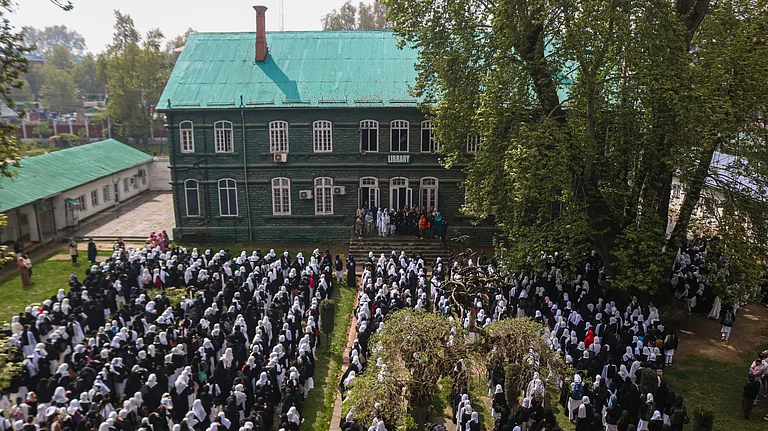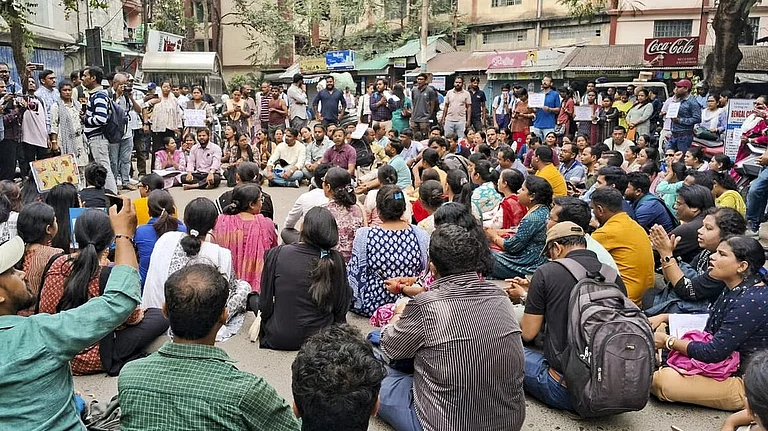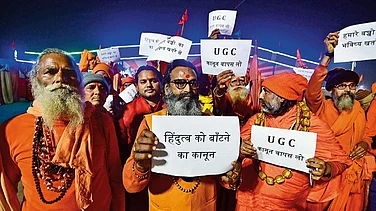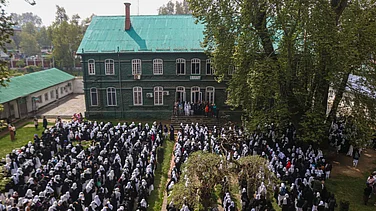The Supreme Court will on Monday take up a clutch of petitions seeking legal recognition of same-sex marriages.
Though homosexuality was decriminalised in 2018, same-sex marriages continue to be unacknowledged and unrecognised by Indian laws. Both the Government of India and ruling Bharatiya Janata Party (BJP) have opposed any recognition to same-sex marriages.
Earlier on January 6, the Supreme Court transferred to itself various petitions seeking recognition of same-sex marriages in different high courts. The petitions filed so far seek recognition under Hindu Marriage Act (HMA), Special Marriage Act (SMA), and Foreign Marriage Act (FMA).
A bench of Chief Justice of India (CJI) DY Chandrachud and Justices PS Narasimha and JB Pardiwala will take up the pleas on Monday.
The BJP-led Union government has filed an affidavit in the apex court in response to the pleas that said same-sex marriages cannot be treated at par with heterosexual marriages and that there is a difference between decriminalisation and legitmisation of homosexuality.
Here we explain what the petitions say and what the government has said so far in the matter.
What do PILs on same sex marriage recognition say?
A number of petitions were filed in recent years in various high courts for the legal recognition of same-sex marriages. Gender rights campaigners believe recognising same-sex marriages is the next logical step after decriminalisation of homosexuality.
Earlier on January 6, the Supreme Court transferred these petitions to itself from different high courts. A bench of CJI DY Chandrachud and Justices PS Narasimha and JB Pardiwala is considering the matter. Incidentally, Chandrachud was also on the bench in 2018 that decrminalised homosexuality.
Since personal affairs such as marriage and divorce are governed by laws specific to communities in India, the recognition to same-sex marriages has also been sought under community-specific laws, most notably under the Hindu Marriage Act (HMA). The HMA also applies to Buddhists, Sikhs, Jains, and all the sects of Hinduism — including Lingayats, a section of which is calling for it to be identified as a religion separate from Hinduism.
One of the earliest petitions was filed in 2020 in the Delhi High Court by Abhijit Iyer-Mitra. He argues that the HMA does not distinguish between heterosexual and homosexual marriages in its wording. To drive this point, he argues that HMA requires "any two Hindus" for a marriage, according to a copy of the petition accessed by Outlook.
While listing the conditions for marriage, HMA’s Section 5 says, "A marriage may be solemnised between any two Hindus…."
Other petitions have also sought recognition under Special Marriage Act (SMA), which is a secular law. The reasoning is similar to the one in Iyer-Mitra’s petition regarding the Hindu Marriage Act — the gender-neutral wording. Legal experts highlight that SMA is more liberal than HMA with its wording.
Listing the conditions related to solemnising marriages under SMA, the law’s section 4 says "a marriage between any two persons may be solemnised under this Act (emphasis added)" and does not mention ‘husband’ or ‘wife’ in its sub-section containing the conditions.
Listing the age eligibility, SMA’s section 4 (c), says, "The male has completed the age of twenty-one years and the female the age of eighteen years." However, the sub-section does not explicitly indicate that this eligibility is for a male to marry a female, and it is argued that this can be read as a gender-neutral provision.
The government's stand on same-sex marriages
The BJP-led Union government has repeatedly challenged any recognition to same-sex marriages, saying that it's not legitmisied and recognising it would create havoc in the Indian society.
In February 2021, the Centre said a marriage is only between a man and a woman and that interferance in current marriage laws "would cause havoc" in the society, according to India Today. The Centre further said the same-sex marriage cannot be a fundamental right.
"Despite the decriminalisation of Section 377 of the Indian Penal Code (IPC), the Petitioners cannot claim a fundamental right for same-sex marriage...[Decriminalisation of homosexuality] applies to aspects which would be covered within the personal private domain of individuals [akin to the right to privacy] and cannot include the public right in the nature of recognition of same-sex marriage and thereby legitimizing a particular human conduct," said the Centre, as per India Today.
In December 2022, BJP leader Sushil Modi termed the campaign for same-sex marriage recognitiona a "left-liberal" ploy to change "ethos of India". He also questioned the role of Judiciary in the matter.
"Two judges can't decide on such an important social issue, which warrants a debate in Parliament and in society at large. Some left liberals and activists are making efforts to change the ethos of the country. I urge government to strongly argue against same-sex marriage in court," said Modi at the time.
What does the latest government affidavit say?
In line with previous submissions on same-sex marriages, the BJP-led Union government in an affidavit in the Supreme Court has again opposed the pleas. Te
The Centre said that while same-sex unions or non-heterosexual marriags are not unlawful, there is no recognition either and there is no legitimacy despite decriminalisation of homosexuality in 2018.
The Centre also said the fundamental right to life and liberty cannot include any implicit approval of same-sex marriage.
The Centre said that a special status which is granted to heterosexual marriage cannot be construed as a discrimination against same-sex couples under Article 15(1) of the Constitution or as a privileging of heterosexuality. This is because no other forms of cohabitation, including heterosexual live-in relationships, enjoys the same status as heterosexual marriage, said the Centre.
The Centre said, "Thus, it can be clearly seen that not every heterosexual union has a status at par with marriage. To fall foul of Article 15(1), there should be discrimination only on the basis of sex. It is evident that this condition precedent is not at all satisfied in the present case. Article 15 is therefore inapplicable and cannot be used to assail the concerned statutory provisions."
The Centre also said that the fundamental right under Article 21 is subject to the procedure established by law and the same cannot be expanded to include the fundamental right for a same-sex marriage to be recognised under the laws of the country which in fact mandate the contrary.
"It is submitted at that there can be no fundamental right for recognition of a particular form of social relationship. While it is certainly true that all citizens have a right to association under Article 19, there is no concomitant right that such associations must necessarily be granted legal recognition by the State. Nor can the right to life and liberty under Article 21 be read to include within it any implicit approval of same sex marriage," said the Centre.
The Centre added that following a Supreme Court verdict in 2018, the only change is that persons of the same sex can engage in consensual sexual intercourse without being held criminally liable under Section 377 of the Indian Penal Code.
"This, and no more than this, is what has been held in that case. While the aforesaid conduct has been decriminalised, it has by no means been legitimised. In fact, the reading of Article 21 in (the 2018 verdict) expressly does not include marriage, as seen from the cited extract," it said.
Referring to the 2018 verdict, the government said that the dictum of it does not extend the right to privacy to include a fundamental right in the nature of a right to marry by two individuals of the same gender in contravention of prevailing statutory laws.
It said the observations in the 2018 verdict cannot be treated as conferring a fundamental right of being recognised in a marriage under Indian personal laws whether codified or otherwise.
"It is submitted that even if such right is claimed under Article 21, such right can be curtailed by competent legislature on permissible constitutional grounds including legitimate state interest. It is submitted that there cannot be an untrammelled right under Article 21 and cannot override other constitutional principles," it said.
The Centre said that the principles of legitimate state interest as an exception to life and liberty under Article 21 would apply to the present case and the statutory recognition of marriage as a union between a "man" and a "woman" is intrinsically linked to the recognition of heterogeneous institution of marriage and the acceptance of the Indian society based upon its own cultural and societal values which are recognised by the competent legislature.
"In a same sex marriage, it is neither possible nor feasible to term one as 'husband' and the other as 'wife' in the context of legislative scheme of various statutes. Resultantly, the statutory scheme of many statutory enactments will become otiose," it said.
The government said that the intent of the legislature was limited to the recognition of a legal relationship of marriage between a man and a woman, represented as a husband and wife. Any other recognition over and above the conventional relationship of marriage between a man and woman would cause irreconcilable violence to the language of the statute.
The government said that if the prayer of the petitioners is recognised, it may lead to further anomalies in other enactments governing marriages of Christian and Muslim persons.
The government said that in terms of Article 14 of the Constitution, same-sex relationships and heterosexual relationships are clearly distinct classes which cannot be treated identically.
(With PTI inputs)


























